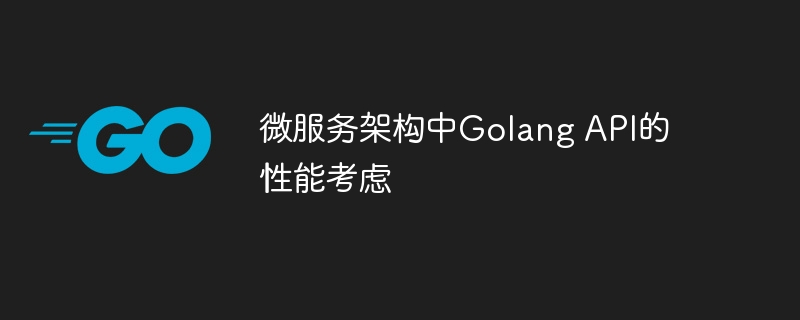
In order to optimize the performance of Go API, it is recommended to: 1. Use a static file caching mechanism; 2. Use a distributed tracing mechanism to track the request processing process in order to discover and solve performance bottlenecks. These technologies can effectively reduce latency and improve throughput, thereby improving the overall performance and stability of the microservice architecture.

Performance optimization of Go API in microservice architecture
Introduction
In microservice architecture , performance is critical. This article will focus on how to optimize the performance of Go APIs through various techniques to reduce latency and increase throughput.
Code Example
Static File Cache
// ./handlers/cache.go
package handlers
import (
"net/http"
"time"
"github.com/go-cache/go-cache"
)
// Cache is an in-memory cache.
var Cache = cache.New(5*time.Minute, 10*time.Minute)
// CacheRequestHandler is a middleware that caches HTTP responses.
func CacheRequestHandler(next http.Handler) http.Handler {
return http.HandlerFunc(func(w http.ResponseWriter, r *http.Request) {
// Check if the response is already cached.
if cachedResponse, found := Cache.Get(r.URL.Path); found {
// If found, serve the cached response.
w.Write(cachedResponse.([]byte))
return
}
// If not found, call the next handler.
next.ServeHTTP(w, r)
// Cache the response for future requests.
Cache.Set(r.URL.Path, w, cache.DefaultExpiration)
})
}// ./main.go
package main
import (
"fmt"
"net/http"
"github.com/gorilla/mux"
"./handlers"
)
func main() {
r := mux.NewRouter()
// Add middleware to cache static file responses.
r.Use(handlers.CacheRequestHandler)
}Distributed Tracing
// ./handlers/trace.go
package handlers
import (
"context"
"fmt"
"net/http"
"github.com/opentracing/opentracing-go"
"github.com/opentracing/opentracing-go/ext"
)
func TracesHandler(w http.ResponseWriter, r *http.Request) {
// Create a new span for this request.
span, ctx := opentracing.StartSpanFromContext(r.Context(), "traces")
// Add some tags to the span.
ext.HTTPMethod.Set(span, r.Method)
ext.HTTPUrl.Set(span, r.RequestURI)
// Simulate work being done.
fmt.Fprintln(w, "Hello, traces!")
// Finish the span.
span.Finish()
}// ./main.go
package main
import (
"fmt"
"net/http"
"github.com/gorilla/mux"
"github.com/opentracing/opentracing-go"
"github.com/uber/jaeger-client-go"
"github.com/uber/jaeger-client-go/config"
)
func main() {
// Configure and initialize Jaeger tracer.
cfg := &config.Configuration{
ServiceName: "go-api",
}
tracer, closer, err := cfg.NewTracer()
if err != nil {
panic(err)
}
defer closer.Close()
opentracing.SetGlobalTracer(tracer)
r := mux.NewRouter()
// Add route that uses tracing.
r.HandleFunc("/traces", handlers.TracesHandler)
}Conclusion
By implementing these performance optimization techniques, Go APIs can run efficiently in a microservices architecture, thereby improving user satisfaction and overall system performance.
The above is the detailed content of Performance considerations for Golang API in microservice architecture. For more information, please follow other related articles on the PHP Chinese website!




